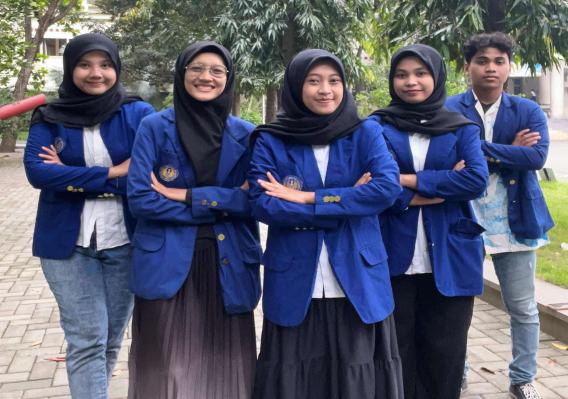Nano-Hydroxyapatite Gel from Tiger Snail Shells to Prevent Dental Caries

Students of the Faculty of Mathematics and Natural Sciences at UNY, through the Student Creativity Program (PKM), conducted a research titled “Gel Nano-Hydroxyapatite (n-HAp) Based on Tiger Snail Shells: Biocomposite Innovation Kurma Ajwa / Siwak / Propolis for Enamel Remineralisation of Teeth”. They developed this innovation in dental health by utilising waste tiger snail shells (cangkang keong macan) as a base material for the production of nano-hydroxyapatite gel (n-HAp).
The research team consisted of Eliana Diah Puspita Arum, Lutfi Puspita Meliasari, Ratri Yulina Setiati, Melisa Sekarlina Putri Dayani, and Rizky Amin Saputro.
Team leader Eliana explained that dental caries remains a serious health problem in Indonesia with high prevalence. Caries not only causes cavities, but also may lead to gum infection and potentially fatal complications. Therefore, they aimed to develop a locally-based biomaterial gel capable both of supporting enamel remineralisation and having antibacterial properties.
In this research, the tiger snail shell was chosen because of its high calcium carbonate content, about 97%, making it a potential calcium source for n-HAp synthesis.
The innovation lies in combining n-HAp with natural biopolymers such as Ajwa dates, siwak, and propolis, which act to enhance antibacterial activity against caries-causing bacteria.
The synthesis used the sol-gel method producing high-purity n-HAp, then formulated into a gel using polymer base Na-CMC, guar gum and glycerin. Variations of n-HAp concentrations (0, 10, 20, 30 wt%) were tested to determine the best formulation.
Characterisation tests (XRD, FTIR, SEM) showed high crystallinity and uniform morphology, indicating the gel n-HAp developed is feasible for dental health applications. Antibacterial tests were carried out against Streptococcus mutans, Streptococcus sanguinis, and Lactobacillus acidophilus. The gel showed significant inhibition zones and potential to strengthen tooth enamel.
With this research, the team hopes to present a local-biomaterial based gel for remineralisation of teeth that is not only effective in preventing caries, but also environmentally friendly and has economic value — considering tiger snail shells are abundant in eastern Indonesia.






